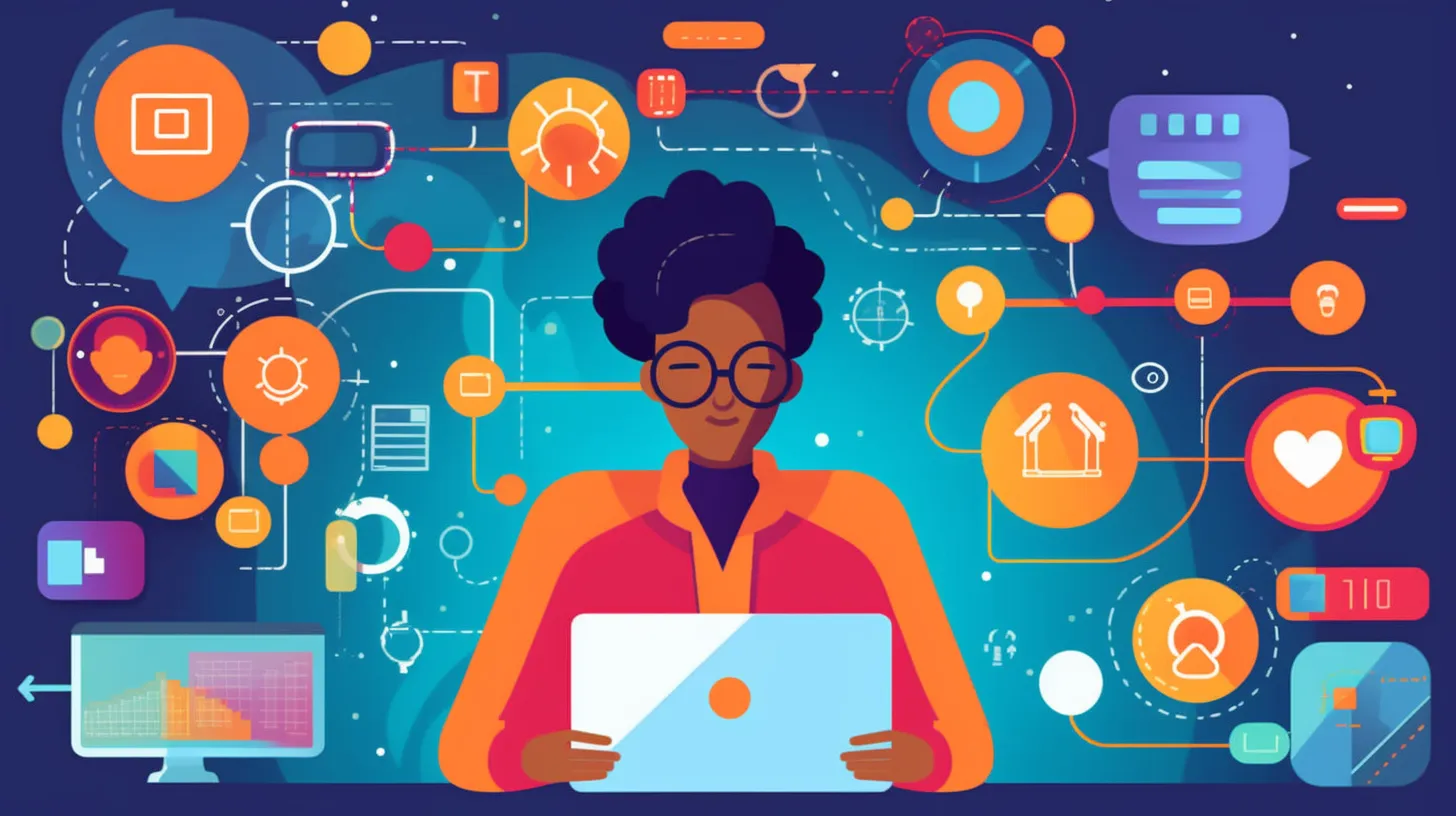Unveiling The Power Of Chatbots: Conversational Marketing In Internet Marketing Services
Are you looking for ways to elevate your internet marketing services and outshine the competition? Look no further than chatbots, the cutting-edge technology taking the digital world by storm. By allowing for personalized, conversational interactions with customers, chatbots offer a powerful tool for increasing engagement and boosting sales.
In this article, we'll explore the basics of chatbot technology, including its benefits in conversational marketing. We'll also provide tips on how to effectively implement chatbots into your marketing strategy and share best practices for their development. With our insights, you'll be well-equipped to leverage the power of chatbots and take your internet marketing services to new heights.
Understanding the Basics of Chatbots
Get ready to discover the incredible potential of chatbots - starting with the basics that'll blow your mind! Chatbots are computer programs designed to simulate conversation with human users. They use Natural Language Processing (NLP) and Artificial Intelligence (AI) technologies to understand and interpret user messages, providing relevant responses in real-time. These bots can be integrated into messaging platforms, websites or mobile apps, allowing businesses to interact with customers 24/7.
Chatbots have become increasingly popular due to their ability to improve customer experience while minimizing costs for businesses. By automating repetitive tasks such as answering frequently asked questions, booking appointments or processing orders, chatbots free up human resources for more complex tasks. Furthermore, chatbots provide a personalized experience by collecting data on user preferences and behavior over time, making it easier for companies to target specific audiences.
The development of chatbot technology has revolutionized conversational marketing in internet marketing services. With an estimated 1.3 billion active monthly users on Facebook Messenger alone, it's no wonder why many businesses are investing in this technology. In the next section, we will explore the benefits of chatbots in conversational marketing and how they can help enhance customer engagement and drive sales.
The Benefits of Chatbots in Conversational Marketing
You'll love how chatbots can enhance your customer interactions and simplify the buying process. One of the biggest benefits of using chatbots in conversational marketing is that they provide 24/7 customer support. Customers can get their questions answered at any time, without having to wait for office hours. This availability increases customer satisfaction and loyalty, which ultimately leads to more sales.
Chatbots also offer personalized experiences to customers. They can analyze a user's behavior and preferences to make tailored recommendations or suggest products that fit their needs. By offering personalized experiences, chatbots help build stronger relationships with customers, improving engagement rates and boosting sales.
Another benefit of using chatbots in conversational marketing is their ability to handle multiple conversations simultaneously. Unlike human agents who can only handle one conversation at a time, chatbots can interact with an unlimited number of users at once. This means that businesses can scale their customer service operations without adding additional staff or increasing costs.
Implementing chatbots in your marketing strategy is easier than you might think! With the right tools and resources, you can create a highly effective conversational marketing campaign that engages audiences on all channels. In the next section, we'll explore some tips for integrating chatbots into your existing marketing efforts seamlessly.
Implementing Chatbots in Your Marketing Strategy
Integrating chatbots into your marketing strategy is a breeze when you have the right tools and resources. There are different types of chatbots available, and choosing the one that fits your business needs is crucial. You can opt for rule-based chatbots, where they follow a pre-programmed set of rules or AI-powered bots that use machine learning algorithms to learn from customer interactions.
Once you've chosen the type of chatbot to integrate, it's time to decide on which platform to build it on. There are several platforms available such as Facebook Messenger, WhatsApp, Slack, and many more. Choosing the right platform depends on where your target audience spends most of their time online.
It's essential to design an engaging chatbot conversation flow that aligns with your brand voice and tone. The conversation should start with a greeting message that sets expectations for the user about what they can expect from interacting with your bot. The conversation flow should also be designed in such a way that it helps users accomplish their goals quickly while providing them with valuable information about your products or services.
With these tips in mind, you're ready to start integrating chatbots into your marketing strategy successfully. However, there are still some best practices for chatbot development that you need to keep in mind if you want to create an effective conversational experience for your customers.
Best Practices for Chatbot Development
When developing a chatbot, it's important to prioritize user experience and create a natural conversation flow that aligns with your brand. To achieve this, consider the following best practices:
- Keep the bot's purpose clear and concise: Users should know what the chatbot can do for them without having to guess or ask unnecessary questions.
- Create multiple pathways for users to reach their destination: Not all users will follow the same conversational path, so it's important to design different routes that lead to the same outcome.
- Use buttons or quick replies to allow users to make choices easily.
- Allow for free-form text input in case users want more flexibility.
Additionally, make sure your chatbot has personality and is consistent with your brand voice. This helps build trust and makes interactions more engaging. By adhering to these best practices, you'll be able to create a highly-effective chatbot that enhances your marketing strategy.
As chatbots continue to gain momentum in internet marketing services, it's essential for businesses to stay ahead of the curve by implementing this technology into their strategies. In the next section, we'll explore how advancements in AI are shaping the future of chatbots and what this means for marketers looking to leverage these tools in their campaigns.
The Future of Chatbots in Internet Marketing Services
Get ready to be blown away by the incredible ways AI is revolutionizing chatbot technology and transforming the way businesses connect with their customers! The future of chatbots in internet marketing services looks bright, as advancements in AI will allow for even more personalized and efficient interactions between brands and consumers. Chatbots are becoming increasingly sophisticated, with natural language processing capabilities that enable them to understand complex requests and respond appropriately.
One exciting development is the integration of chatbots into voice assistants like Amazon's Alexa or Google Home. This means that users can interact with a brand's chatbot through their smart speaker, allowing for hands-free communication. As more people adopt these devices into their homes, brands will need to ensure their chatbots are optimized for voice commands and provide seamless experiences.
Another trend is the use of predictive analytics to enhance chatbot functionality. By analyzing past user behavior and preferences, chatbots can anticipate customer needs and make tailored recommendations. This not only benefits customers by providing relevant information but also helps businesses increase sales by suggesting products or services that align with consumer interests. As AI continues to evolve, we can expect even more advanced applications for predictive analytics in chatbot technology.
It's clear that the future of chatbots in internet marketing services is bright, thanks to advancements in AI technology. From voice assistant integrations to predictive analytics, businesses have a wealth of opportunities to create engaging and efficient conversations with their customers through chatbots. As a marketer or business owner looking to stay ahead of the curve, it's important to keep an eye on emerging trends in this space so you can leverage them effectively for your brand.
Frequently Asked Questions
What are the most common mistakes that businesses make when implementing chatbots in their marketing strategy?
Common chatbot implementation mistakes include inappropriate tone, lack of personalization, and insufficient testing. Remember to tailor your bot's responses to the customer's needs and preferences, and regularly update its knowledge base for optimal performance.
How do chatbots impact the customer experience and satisfaction?
Chatbots improve customer experience by providing fast, personalized responses to inquiries and freeing up human agents for more complex tasks. This leads to increased satisfaction, loyalty, and sales conversion rates.
Are there any ethical concerns surrounding the use of chatbots in marketing?
You may wonder about ethical concerns with chatbots in marketing. There are concerns over privacy, transparency, and customer manipulation. It's important for businesses to use chatbots responsibly and prioritize the needs of their customers.
Can chatbots be used effectively in industries outside of e-commerce and customer service?
"Absolutely! Chatbots can be used effectively in various industries beyond e-commerce and customer service. They can assist with tasks such as scheduling appointments, answering FAQs, and providing personalized recommendations. Explore the possibilities for your industry." 'For example, in healthcare, chatbots can help patients schedule appointments, provide information on medications, and even offer mental health support. In finance, chatbots can assist with account management, bill payment, and investment advice. The potential applications of chatbots are endless and can greatly enhance efficiency and customer satisfaction in various industries.'
How do chatbots fit into a larger omnichannel marketing strategy?
To fit chatbots into an omnichannel marketing strategy, consider their role in customer engagement and lead generation. Use them to personalize messaging, offer assistance, and gather data for targeted campaigns across multiple channels.
Conclusion
Congratulations! You now have a solid understanding of how chatbots can revolutionize conversational marketing in internet marketing services. By utilizing this innovative technology, you can engage with your customers in an interactive and personalized way, ultimately driving sales and increasing customer satisfaction.
When implementing chatbots into your marketing strategy, it is important to remember the benefits they offer, such as 24/7 availability and the ability to handle multiple conversations simultaneously. However, it is also crucial to follow best practices for development, including clear communication and thorough testing.
As we move forward in the world of digital marketing, chatbots will continue to play a significant role in creating effective and efficient communication between businesses and their customers. Embrace this powerful tool and take advantage of its potential to enhance your overall marketing efforts.









